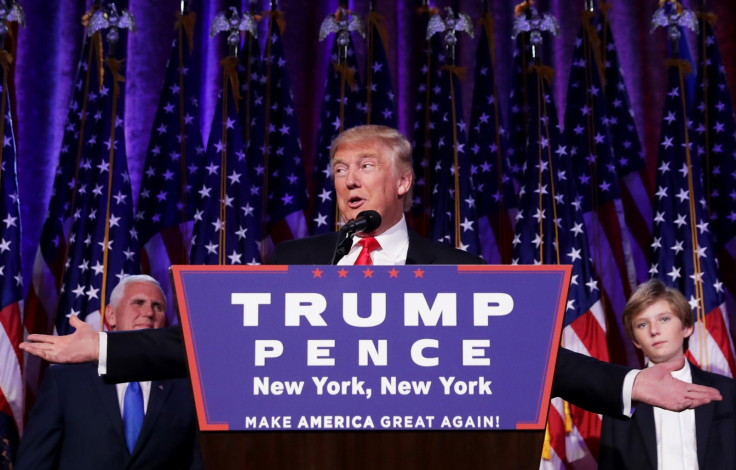Does Donald Trump's win prove the entire political campaigning industry is a colossal fraud?
Trump deserves credit for his low-cost strategy of free media coverage and high-energy giant rallies.

Film-maker Michael Moore presciently described Trump's victory as "the biggest f**k-you ever recorded in human history". Moore aimed his words at a Democratic elite he feels have abandoned the working-classes of the nation.
The entire Trump campaign, by a curious coincidence, was also a gigantic middle finger raised at the political consultant class, who assured us over and over again that Trump's lack of a "ground game" and "get out the vote operation" would guarantee his defeat in the swing states. Throughout the primaries and general election, Trump was massively outspent and out-organised by his political rivals Jeb Bush, Ted Cruz and Hillary Clinton. Clearly, none of it mattered.
Based on data from the final pre-election Federal Election Commission (FEC) returns, as of 19 October Clinton and affiliated outside groups had raised more than one billion dollars and spent $897 million (£722 million) of that, compared with Trump's total spend of $429.5 million. In Florida, Pennsylvania, Wisconsin, Ohio, Iowa, and North Carolina – all must-win swing states that Clinton lost – she spent a total of $213 million on TV advertising. Trump? Just $65.7 million, outspending Clinton only in Wisconsin.
Clinton dominated by similar margins in the field office totals. As of 7 October, she had 489 field offices operating nationwide compared with Trump's 207, and dominated by similar margins in all the swing states. Trump largely outsourced his field operations to the Republican National Congress (RNC), who put in a creditable performance compared with 2012, but are generally thought to have trailed the Clinton operation.
Typically, fear of deviating from the patterns set by the victorious campaigns of previous years keeps candidates locked in a 'Red Queen's race', where each generally raises about as much money as the other, which they spend in fairly similar ways. Obama and Romney, for example, both spent more than $1 billion in 2012, including Super PAC (independent committee) spending. John Kerry and George Bush also spent similar sums, although Obama did substantially outspend McCain in 2008.
In a world of Red Queen races, the causal effect of the spending can be hard to detect since there isn't much variation to exploit in statistical analyses. Before 2016, we didn't really know if a candidate could win if they simply refused to turn up at the starting line.
Trump has taught us that they can. More research is clearly required, but at this point I think the default hypothesis should be that the entire political campaigning industry is a colossal fraud. If any causal effects of 'get out the vote' operations or TV adverts exist, they are surely microscopic by comparison with the effects of broader social and economic trends, and of course the effects of the candidates themselves.
Perhaps Trump deserves a little more credit for his (comparatively) low-cost strategy of aiming to get as much free media coverage as possible while using high-energy rallies to drive enthusiasm.
A simple model of how this works is compelling. Imagine a world of hyper-partisanship, where many individuals not directly involved in politics are nonetheless highly emotionally invested in the outcomes of elections. Imagine a vastly skewed distribution of wealth, where enormous riches are concentrated in a few hands. Imagine also that due to the power of the federal government, there are substantial business advantages to be gained from backing a successful candidate.
Consider further that while these super-rich individuals are greatly interested in election outcomes, they are not themselves political experts and don't really know how to spend their money on behalf of their candidate in the most effective ways. Therefore they outsource the task to the experts. But the incentives of the experts do not align with those of the donors. The experts – the consultant class – are incentivised to keep themselves busy by soaking up as much donor money as they can. The best way for them to do so is simply to spend money as wastefully as possible.
Perhaps Trump deserves a little more credit for his (comparatively) low-cost strategy of aiming to get as much free media coverage as possible while using high-energy rallies to drive enthusiasm
This model is not original. Political scientist Adam Sheingate argued along similar lines in his book Building a Business of Politics, and Rory Ellwood has also explored the incentives of self-interested political consultants in relation to Ben Carson's campaign. Trump's success looks very much like vindication for Sheingate.
It also ought to be the end of the incessant liberal hysteria over the Citizens United Supreme Court decision, which allowed for unlimited political spending by non-profit-making companies and corporations. If the money is almost entirely wasted anyway, what does it matter?
Some caveats are due. Even by the standards of presidential candidates, Trump and Clinton were both already exceptionally well-known to voters as both have been famous for what feels like forever. In a more typical cycle, perhaps TV advertising can help – though with quickly diminishing returns – by allowing voters to get to know the candidates (though would not Trump's strategy of maximising free media coverage be cheaper?).
It is not my claim that traditional 'get out the vote' strategies are entirely useless, just that their added value is vastly disproportionate to their cost, and that of all recent US presidential elections, only George W Bush's triumph over Al Gore in Florida in 2000 was close enough for the tiny effects of get-out-the-vote to matter.
With these caveats in mind, I invite the political consultants of this world to prove the default hypothesis wrong. If you have any good evidence that your business is not, in large part, a gigantic scam, I look forward to seeing it.
Andrew Sabisky is an independent research worker and writer.
© Copyright IBTimes 2024. All rights reserved.






